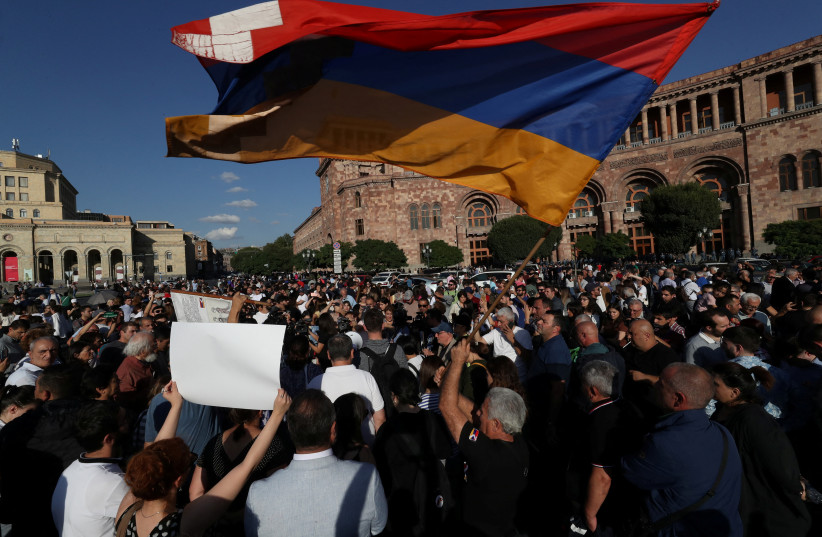‘There are forces in the world that seek to drive a wedge between Armenians and Jews. They spread fake news about supposed antisemitism in Armenia; they seek to provoke Armenians about Israel’s own (undeniably devastating) arms supplies to Armenia’s aggressive neighbor Azerbaijan”.
This is a quote by Grigor Hovhannissian, a former Armenian deputy foreign minister. In his article, “Armenia and Iran: False claims” (The Jerusalem Post, August 12), he insinuates that I am a representative of those “forces,” for reporting about the strengthening of Iran-Armenian relations, especially the arms deal which Armenia has denied.
There are many things that Armenia denies. Let’s start with “fake news about supposed antisemitism in Armenia.” The authorities denied numerous attacks on the Mordechai Navi Synagogue and told stories about some “foreigners” who arrived, tried to burn the synagogue, which is allegedly protected, and left the country. The authorities denied the existence of the Armenian Secret Army for the Liberation of Armenia organization, which not only took responsibility for the attacks but threatened that new attacks were imminent.
How about the neo-Nazi parade in the middle of Yerevan at the beginning of this year? Armenian authorities started by denying it and later blamed it again on “foreigners” and how the authorities “took care of them.” So how is it that the leader of the Armenian Neo-Nazis, Hayk Nazaryan, freely roams the streets of Yerevan, takes pictures with numerous supporters, and posts them on social media, with blatant antisemitic calls to action.
Why were the neo-Nazis marching in the middle of Yerevan? They were marching to a monument of the Nazi collaborator, Garegin Nzdeh, erected in the central square.

How about the World Antisemitism Index 2014 of the Anti-Defamation League, and the 2016 survey of antisemitism in 18 European countries by the reputed Pew Research Center of Washington? Are their reports of flagrant antisemitism in Armenia also fake?
Are the reports of the US Institute for the Study of Global Antisemitism and Policy from 2023-2024 fake? Or the reports of the Israeli Ministry of Diaspora Affairs and Combating Antisemitism, and the Prime Ministers Office? Between two versions of reality: one with rampant antisemitism in Armenia and the other, in which Armenia is swamped with “Nazi foreigners” who commit various antisemitic acts before disappearing into the thin air, I find myself strongly inclined to believe in the former version.
But let’s go back to Armenia’s friend, Iran. Yerevan and Tehran have a long history of strategic cooperation. In late 2008, US diplomats concluded that the government of Armenia had supplied Iran with rockets and machine guns used to kill American troops in Iraq.
This was long before the strengthening of the military cooperation between Yerevan and Tehran in 2016. It was also before Yerevan became one of the major routes for supplying Iranian drones and missiles to Russia.
As for the recent deal with Iran, which involves intelligence cooperation, close military relations, training, and the establishment of bases on Armenian soil, denying it is implausible. Several days after the initial report about the deal, Prime Minister Nikol Pashinyan went to Tehran to participate in Iran’s president-elect’s swearing-in ceremony. He was one of only two leaders who arrived at the ceremony. All other countries sent low-level officials.
Pashinyan and Khamenei
Pashinyan also had a meeting with the Supreme Leader Ali Khamenei, who said: “We are deeply committed to enhancing our relations with Armenia and the collaboration between our two nations, founded on mutual interests and independent of policies of others, will continue with unwavering strength.”
There are reports that Pashinyan was supposed to meet with the Hamas leader Ismail Haniyeh, who wanted to thank him personally for the recognition of the nonexistent “Palestinian state,” but there is no additional confirmation of this since Haniyeh has paid for his crimes.
Yerevan may try to deny that as well, but anybody who knows the history of the Middle East remembers that Armenians have always supported Palestinian terrorist organizations. One of the Armenian national heroes, Monte Melkonian, bragged about fighting against Israelis. You can read about that in the book My Brother’s Road: An American’s Fateful Journey to Armenia by Markar Melkonian.
I would like to ask Mr. Hovhannissian, if he really wants to enhance relations between our people, then he should use Armenian media – both local and abroad – to fight antisemitism and change his state’s policies that unfortunately have turned Armenia into an Iranian proxy.
The writer is a Middle East scholar and commentator on the region.
